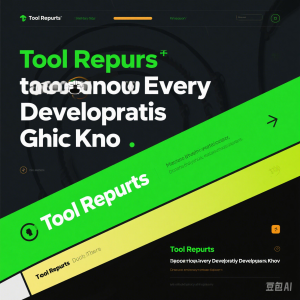Top Tool Resources Every Developer Should Know

In the fast – paced world of software development, having the right tool resources can significantly boost a developer’s productivity and the quality of their code. This article delves into some of the must – know tool resources that every developer should be familiar with.
Integrated Development Environments (IDEs) for Seamless Coding
- Visual Studio Code
Visual Studio Code, developed by Microsoft, has become one of the most popular IDEs among developers. It offers a lightweight yet powerful coding environment with support for a wide range of programming languages, including Python, JavaScript, C++, and more. Its extensive library of extensions allows developers to customize the IDE according to their specific needs. For example, extensions like “Python” by Microsoft provide intelligent code completion, syntax highlighting, and debugging support for Python developers. The integrated terminal in Visual Studio Code enables developers to run commands and manage their projects without leaving the IDE, streamlining the development process.
- IntelliJ IDEA
IntelliJ IDEA, developed by JetBrains, is a feature – rich IDE, especially popular among Java developers. It offers advanced code analysis, refactoring tools, and intelligent code completion. The IDE’s “Code Vision” feature provides a visual representation of the code structure, making it easier for developers to understand and navigate complex codebases. IntelliJ IDEA also has excellent support for various frameworks, such as Spring for Java development. This IDE can significantly reduce development time by automating repetitive tasks and providing real – time error checking.
Version Control Systems: The Backbone of Collaborative Projects
- Git
Git is the most widely used distributed version control system. It allows developers to track changes in their codebase over time, collaborate with other developers, and manage different versions of their projects. With Git, developers can create branches for new features or bug fixes, work on them independently, and then merge the changes back into the main codebase. GitHub, a web – based hosting service for Git repositories, has further popularized Git by providing a user – friendly interface for sharing and collaborating on projects. Developers can easily fork repositories, make pull requests, and participate in open – source projects on GitHub. For example, many open – source Python projects, like Django, have their code hosted on GitHub, and developers from around the world contribute to them using Git.
- Subversion (SVN)
Subversion, often referred to as SVN, is a centralized version control system. While it has been around longer than Git, it still has its place in the development world, especially in enterprise settings where a more controlled environment is required. SVN stores all the versions of a project in a central repository. Developers check out a working copy of the code from the repository, make changes, and then commit those changes back to the central repository. SVN is known for its simplicity in handling binary files and its ability to provide detailed change logs, which can be useful for auditing purposes.
Testing Tools for Ensuring Code Quality
- JUnit
JUnit is a widely used unit – testing framework for Java. It provides a simple and effective way for developers to write and run unit tests for their Java code. JUnit allows developers to define test cases, group them into test suites, and execute them with ease. For example, a developer can write a JUnit test case to verify the functionality of a method in a Java class. The test case can check if the method returns the expected output for different input values. JUnit also provides assertions, which are used to verify the results of the tests. By using JUnit, developers can catch bugs early in the development cycle, leading to more reliable and robust code.
- Selenium
Selenium is a popular tool for web application testing. It allows developers to automate web browser actions, such as clicking buttons, filling forms, and navigating between pages. Selenium can be used with various programming languages, including Python, Java, and C#. For example, in a Python project, developers can use the Selenium WebDriver to write scripts that interact with a web application. They can test the functionality of a web page, such as whether a form submission works correctly or if a particular link redirects to the expected page. Selenium is especially useful for end – to – end testing of web applications, ensuring that the user experience is smooth and error – free.
Project Management Tools for Streamlined Workflow
- Jira
Jira, developed by Atlassian, is a powerful project management tool widely used in the software development industry. It allows teams to plan, track, and manage their projects. Jira uses a system of issues, such as tasks, bugs, and features, which can be organized into projects and sprints (in an Agile development context). Teams can assign issues to team members, set due dates, and track the progress of each issue. Jira also provides detailed reporting features, such as burndown charts, which show the progress of a project over time. For example, a development team working on a new software product can use Jira to manage the development process, from planning the features to tracking the bugs found during testing.
- Trello
Trello is a visual project management tool that uses a board – and – card system. Each board represents a project, and cards on the board represent tasks or issues. Teams can move cards across different columns on the board, which typically represent different stages of the project, such as “To – Do”, “In Progress”, and “Done”. Trello is highly customizable, and teams can add labels, due dates, and attachments to cards. It also has integrations with other tools, such as GitHub and Slack, which can enhance team communication and collaboration. For example, a small startup team can use Trello to manage their software development projects, with each card representing a specific task for a developer.
Cloud – based Resources for Scalable Development
- Amazon Web Services (AWS)
Amazon Web Services offers a vast array of cloud – based services that are invaluable for developers. AWS Elastic Compute Cloud (EC2) provides scalable computing power, allowing developers to launch virtual machines (instances) with various configurations. AWS Lambda enables developers to run code without having to manage servers, as it is a serverless computing platform. For example, a developer can use AWS Lambda to create a backend service for a mobile application. The service can be triggered by events, such as a user uploading a file, and can scale automatically based on the incoming traffic. AWS also offers services like Amazon S3 for storage, Amazon RDS for databases, and Amazon CloudFront for content delivery, providing a comprehensive set of resources for building and deploying applications.
- Google Cloud Platform (GCP)
Google Cloud Platform is another major cloud provider with a wide range of services for developers. GCP Compute Engine offers high – performance virtual machines for running applications. Google Kubernetes Engine (GKE) is a managed Kubernetes service that simplifies container orchestration for developers. Kubernetes allows developers to deploy, manage, and scale containerized applications easily. For example, a development team can use GKE to deploy their microservices – based application, where each microservice is containerized. GCP also provides services like Google Cloud Storage for storing data, Google Cloud SQL for relational databases, and Google Cloud Functions for serverless computing, making it a versatile platform for developers.
In conclusion, these tool resources play a crucial role in the software development process. Whether it’s coding, version control, testing, project management, or cloud – based development, having a good understanding and utilization of these tools can significantly enhance a developer’s efficiency and the success of their projects.




